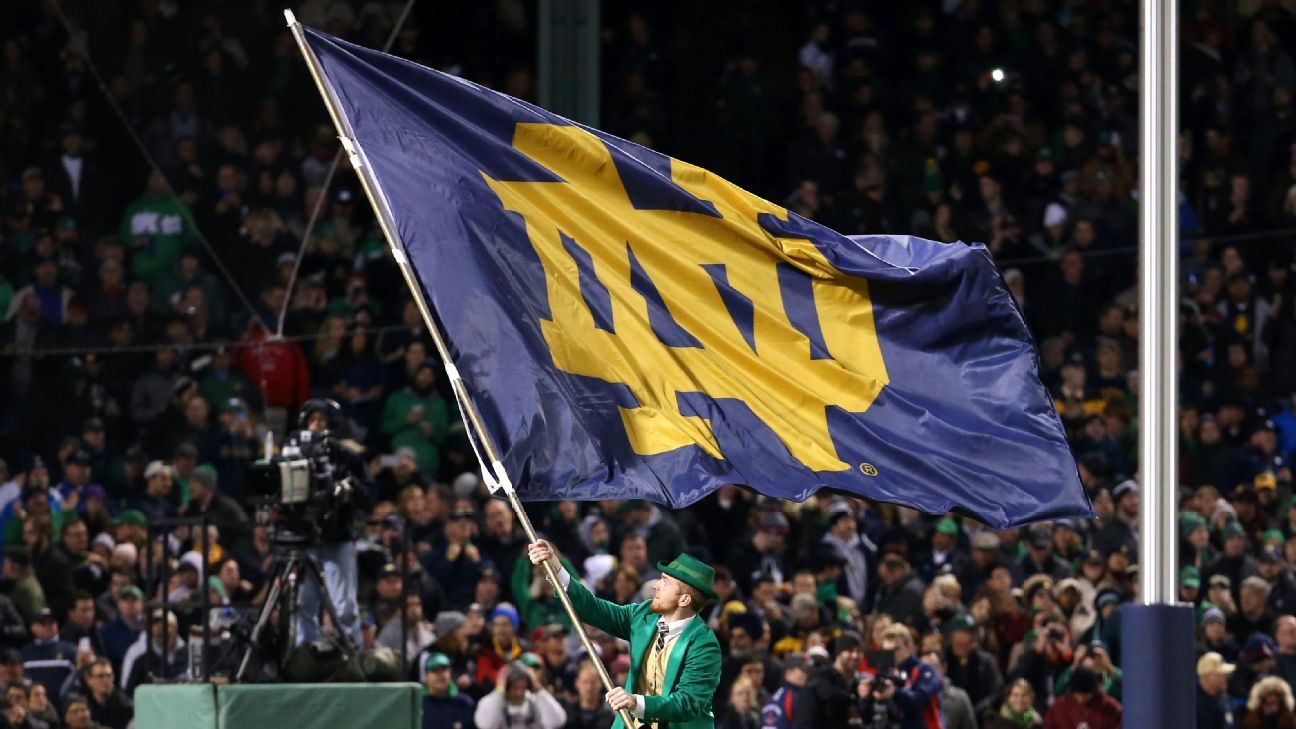While college athletics undergoes sweeping changes, Notre Dame‘s desire to remain independent is constant, as Notre Dame leadership feels “as secure as ever” in its football status, first-year athletic director Pete Bevacqua told ESPN on Thursday.
Bevacqua, who began his new role on Monday following the retirement of longtime athletic director Jack Swarbrick, cited multiple reasons for the athletic department’s continued sense of security. He said the university’s most recent television deal with NBC, its partnership with the ACC for all other sports except hockey, and the new College Football Playoff deal all provide financial security. He also said he’s “bullish” on the future of the football program as coach Marcus Freeman enters his third season.
“We are now in as good of a position as we’ve ever been in the modern era of college football to be independent,” said Bevacqua, a 1993 Notre Dame graduate who returned to the school in 2023 in an administrative role after serving as the third chairman in the history of NBC Sports. “You see all the conference realignment, you see everything that’s happened, I think our position as being independent in football quite frankly is certainly more unique than ever, but also more valuable than ever.”
According to sources, in the new six-year CFP agreement, which begins in 2026, Notre Dame has the potential to earn roughly $18 million annually, which would significantly elevate the program closer to what the Big Ten and SEC schools will be making (more than $21 million). It would also boost the Irish ahead of the ACC and Big 12 schools.
Starting in 2026, Notre Dame is expected to get more than $12 million from CFP revenue distribution, which is in the same ballpark as ACC schools (more than $13 million annually) and Big 12 schools (also more than $12 million each).
Bevacqua declined to comment on the CFP revenue agreements, but industry sources told ESPN there will also be a $6 million financial incentive for any independent team that reaches the CFP — what should typically be a source of additional revenue for the Irish because Notre Dame has access protections built into the new CFP contract that will survive regardless of whether the ultimate format includes 12 or 14 teams. If Oregon State and Washington State don’t join a conference by then, they would also be eligible for the additional $6 million, along with UConn, which is the only other independent school remaining. There will no longer be a participation bonus for any of the conferences.
“Our dollar figure that’s derived from the CFP for us is quite strong, plus the fact we have the ability to earn additional revenue in the instances where we make the CFP, which puts us in an even stronger position,” Bevacqua said. “So when you step back and look at the totality of those three elements — the NBC relationship, the ACC Network relationship and the CFP — we’re in an incredibly strong position relative to the rest of the college sports world.”
With the Big Ten and SEC having separated from the other leagues in both size and wealth, and the ACC entangled in lawsuits with Clemson and Florida State, questions continue to swirl about further realignment. Bevacqua said Notre Dame feels “very strongly” about its relationship with the ACC and commissioner Jim Phillips, also a Notre Dame graduate.
“Clearly like everybody else in the conference we’re certainly talking about FSU and Clemson with the conference and Jim Phillips, but we feel that the conference is in such great shape, has a long-term relationship with ESPN which is important, and has secured its very important inclusion in the CFP like we have for the next eight years,” Bevacqua said. “There’s a lot of unbelievably great things going on for the ACC and we value our relationship and being a part of that conference in the overwhelming majority of our sports with the two exceptions, obviously football and hockey.”
Notre Dame is the most valuable property remaining — and the ACC hasn’t been shy in the past about courting the Irish as a full member — but Bevacqua said “it’s fundamentally important to Notre Dame to stay independent in football” because it has allowed the school to position itself as a national university as it relates to football.
As confident as Bevacqua is in Freeman’s future leading the Irish, he recognized the pressure to win to sustain that national brand and said, there’s “an absolute need for us to win a national championship.”
“That pressure has been on Notre Dame since Knute Rockne,” he said. “That’s not a pressure quite frankly we shy away from. That’s a pressure we accept. As a lifelong Notre Dame fan and as an alumnus, we thrive on that pressure. There’s an understanding that Notre Dame football — maybe more than anywhere else in the country, certainly as much as anywhere else in the country — is part of the DNA of this university.
“We know that is a key priority of ours,” he said, “not only to stay relevant, but quite frankly to win a national championship and be the best.”
